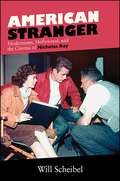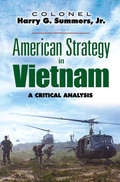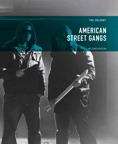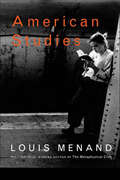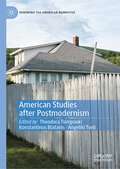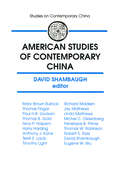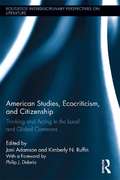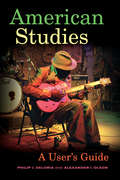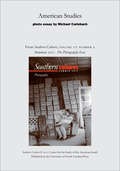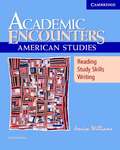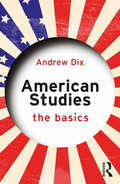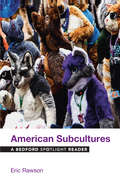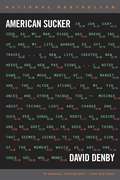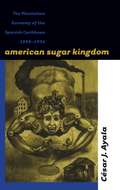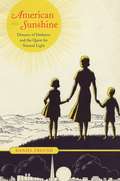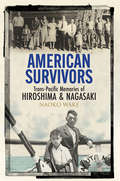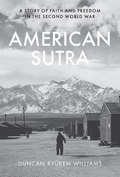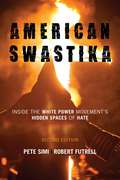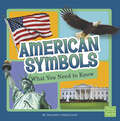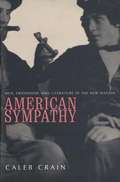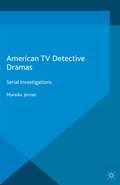- Table View
- List View
American Stranger: Modernisms, Hollywood, and the Cinema of Nicholas Ray (SUNY series, Horizons of Cinema)
by Will ScheibelHow does cinema culture imagine one of its favorite figures, the rebel? The reputation of the American director Nicholas Ray provides a particularly notable example. Most famous for Rebel Without a Cause, Ray has since been canonized as a "rebel auteur" and celebrated for seeking a personal vision and signature style under the industrial pressures of Classical Hollywood during its late studio period. In American Stranger, Will Scheibel reconstructs how Ray's reputation developed over time, analyzing the different historical practices of modernism that set new horizons for artistic rebellion in postwar cinema.Drawing on biographical legends, interviews, film reviews, articles in both national newspapers and international film magazines, and star promotion and publicity, Scheibel examines the contexts in which Ray's reputation was constructed. These include the consolidation of director-based film criticism and the rise of film studies as an academic discipline; star performances and personifications of the rebel male in Ray's films; the counterculture in which Ray promoted himself as a teacher and worked as a political avant-gardist; and the art cinemas of Jean-Luc Godard, Wim Wenders, and Jim Jarmusch, each of whom were influenced by Ray. In addition to Rebel Without a Cause, Scheibel also analyzes such classic films as The Lusty Men and In a Lonely Place, as well as collaborative, less-examined films from his later career outside of Hollywood, We Can't Go Home Again and Lightning Over Water. Reconstructing the evolution of Ray's place in cinema culture, this intellectual history measures the standards for both rebellion and convention, for the vanguard and the establishment, that determine an artistic reputation.
American Strategy in Vietnam: A Critical Analysis
by Col. Harry G Summers Jr.Required reading at The National, Naval, and Air War Colleges, as well as other high level military institutions throughout the United States, American Strategy in Vietnam has become one of the most-well-respected investigations of the strategic and tactical policies of the U.S. Army during the twentieth century. Crackling with keen insight and clarity, this invaluable resource has renewed the study of strategy and its vital relationship to the art of war.Drawing heavily on the brilliant theories of the great Prussian general Carl von Clausewitz, this is the definitive politico-military assessment of the Vietnam War. Instead of merely examining the individual strategic flaws of the conflict, the book embraces a larger scope: how the weak relationship between military strategy and national policy led to the Vietnam War's unpopular and faulty definition--and eventual failure. Particularly relevant today, this important exposé stresses the futility of any military action without the full support and involvement of the country's people.
American Street Gangs
by Tim DelaneyThe text provides the necessary background material on gangs, grounding the reader with the cultural and structural context of gang activity. <P><P>Criminal activity is also connected to socioeconomic influences, thus encouraging students to consider the many factors that affect and influence gang involvement. <P><P>American Street Gangs provides a comprehensive review of all the critical elements relevant to gang life.
American Studies
by Louis MenandAt each step of this journey through American cultural history, Louis Menand has an original point to make: he explains the real significance of William James's nervous breakdown, and of the anti-Semitism in T. S. Eliot's writing. He reveals the reasons for the remarkable commercial successes of William Shawn's New Yorker and William Paley's CBS. He uncovers the connection between Larry Flynt's Hustler and Jerry Falwell's evangelism, between the atom bomb and the Scholastic Aptitude Test. He locates the importance of Richard Wright, Norman Mailer, Pauline Kael, Christopher Lasch, and Rolling Stone magazine. And he lends an ear to Al Gore in the White House as the Starr Report is finally presented to the public. Like his critically acclaimed bestseller, The Metaphysical Club, American Studies is intellectual and cultural history at its best: game and detached, with a strong curiosity about the political underpinnings of ideas and about the reasons successful ideas insinuate themselves into the culture at large. From one of our leading thinkers and critics, known both for his "sly wit and reportorial high-jinks [and] clarity and rigor" (The Nation), these essays are incisive, surprising, and impossible to put down.
American Studies after Postmodernism (Renewing the American Narrative)
by Theodora Tsimpouki Konstantinos Blatanis Angeliki TsetiThis book explores the major challenges that the long-standing and diversely debated demise of postmodernism signifies for American literature, art, culture, history, and politics, in the present, third decade of the twenty-first century. Its scope comprises a vigorous discussion of all these diverse fields undertaken by distinguished scholars as well as junior researchers, U.S. Americanists and European Americanists alike. Focusing on socio-political and cultural developments in the contemporary U.S., their contributions highlight the interconnectedness of the geopolitical, economic, environmental and technological crises that define the historical present on global scale. Chapter 16 is available open access under a Creative Commons Attribution 4.0 International License via link.springer.com.
American Studies of Contemporary China (Studies On Contemporary China)
by David L. ShambaughExamines the historical evolution of contemporary China studies in the United States, reflecting the growth and maturation of the field since the Communist Party seized power in 1949.
American Studies, Ecocriticism, and Citizenship: Thinking and Acting in the Local and Global Commons (Routledge Interdisciplinary Perspectives on Literature)
by Philip J. Deloria Joni Adamson Kimberly N. RuffinThis collection reclaims public intellectuals and scholars important to the foundational work in American Studies that contributed to emerging conceptions of an "ecological citizenship" advocating something other than nationalism or an "exclusionary ethics of place." Co-editors Adamson and Ruffin recover underrecognized field genealogies in American Studies (i.e. the work of early scholars whose scope was transnational and whose activism focused on race, class and gender) and ecocriticism (i.e. the work of movement leaders, activists and scholars concerned with environmental justice whose work predates the 1990s advent of the field). They stress the necessity of a confluence of intellectual traditions, or "interdisciplinarities," in meeting the challenges presented by the "anthropocene," a new era in which human beings have the power to radically endanger the planet or support new approaches to transnational, national and ecological citizenship. Contributors to the collection examine literary, historical, and cultural examples from the 19th century to the 21st. They explore notions of the common—namely, common humanity, common wealth, and common ground—and the relation of these notions to often conflicting definitions of who (or what) can have access to "citizenship" and "rights." The book engages in scholarly ecological analysis via the lens of various human groups—ethnic, racial, gendered, coalitional—that are shaping twenty-first century environmental experience and vision. Read together, the essays included in American Studies, Ecocriticism, and Citizenship create a "methodological commons" where environmental justice case studies and interviews with activists and artists living in places as diverse as the U.S., Canada, Haiti, Puerto Rico, Taiwan and the Navajo Nation, can be considered alongside literary and social science analysis that contributes significantly to current debates catalyzed by nuclear meltdowns, oil spills, hurricanes, and climate change, but also by hopes for a common future that will ensure the rights of all beings--human and nonhuman-- to exist, maintain, and regenerate life cycles and evolutionary processes
American Studies: A User's Guide
by Philip J. Deloria Alexander I. OlsonAmerican Studies has long been a home for adventurous students seeking to understand the culture and politics of the United States. This welcoming spirit has found appeal around the world, but at the heart of the field is an identity crisis. Nearly every effort to articulate an American Studies methodology has been rejected for fear of losing intellectual flexibility and freedom. But what if these fears are misplaced? Providing a fresh look at American Studies in practice, this book contends that a shared set of “rules” can offer a springboard to creativity. American Studies: A User’s Guide offers readers a critical introduction to the history and methods of the field as well as useful strategies for interpretation, curation, analysis, and theory.
American Studies: An article (Southern Cultures #17:2)
by Michael Carlebach<P>So often we see photographs of a humorless South, but Michael Carlebach reminds us to smile at ourselves. <P>This article appears in the Summer 2011 issue of Southern Cultures:The Photography Issue."Many years ago I concluded that for me truth and beauty, and perhaps wit and wisdom as well, are more likely to reside in what is ordinary and seemingly insignificant. This is, perhaps, a sideways look at America and American culture, but it is one that can produce moments that describe us all, but without makeup and bereft of a spokesperson."
American Studies: Reading, Study Skills, Writing (Academic Encounters)
by Jessica WilliamsThis book engages students with academic readings, photos, graphs, and charts on stimulating topics from the field of American Studies that deal with important events and ideas in American history and culture that are relevant to life today.
American Studies: The Basics (The Basics)
by Andrew DixAmerican Studies: The Basics is an accessible and concise introduction that aims to unpack what American studies does and why it matters. From Moby-Dick to baseball, Hollywood westerns to #BlackLivesMatter, and Disneyland to the U.S. Supreme Court, American studies engages with a myriad of topics in its efforts to understand what the French sociologist Jean Baudrillard called ‘social and cultural America.’ The book begins by considering how America was studied before American studies’ emergence as a recognized discipline in the mid-twentieth century. Successive chapters then explore the rise of American studies, its varied subjects, its distinctive methods of research, its geographical framing, and its politics. Throughout the book, explanatory examples are drawn from across American history and culture. Photographs are examined alongside novels, and historical monuments discussed next to films. The text offers an ideal way into an exciting academic subject of continuing growth and relevance. This book is a must read for those studying and with an interest in American studies.
American Subcultures: A Bedford Spotlight Reader
by Eric RawsonAlthough its subject is American society, this book offers a collection of texts that will stimulate critical thinking and frame opportunities for meaningful writing in general. American Subcultures provides you with several exciting opportunities: to develop a sound writing process appropriate to the argumentative and analytical nature of academic writing; to learn critical thinking and reading skills; to investigate and express personal values; and to master interdisciplinary and versatile forms of written communication. The design of this book is predicated on the notion that good writers, like good students, are made, not born. There is nothing innate about the ability to write well. Strong writing — or academic success in general — results from dedication, curiosity, engagement, and effort. Writing can — and should — be a means of discovery, of generating knowledge, rather than merely an instrument for repackaging and disseminating information. We write to learn rather than merely learn to write.
American Sucker
by David DenbyIn early 2000, the bottom dropped out of the life of New Yorker writer David Denby when his wife announced she was leaving him. To make matters worse, it looked as if he might lose the beloved New York apartment they shared with their children. Determined to hold on to his home and seized by the "irrational exuberance" of the stock market, then approaching its peak, Denby joined the investment frenzy with a particular goal: to make one million dollars so he could buy out his wife's share of their place. Denby gathered courage from stock analysts and from the siren song of CNBC. He listened both skeptically and raptly to dreaming tech gurus and boastful CEOs at investment conferences. He got to know such charming and persuasive New Economy stars as ImClone founder (and Martha Stewart buddy) Sam Waksal and Merrill Lynch Internet analyst Henry Blodget, both of whom would eventually be disgraced in scandals that affected millions of investors. Racing around the country, he struggled to understand the leading-edge technologies of fiber optics and anticancer biotech therapies. He plunged into a season of mania and was swept forward on the alternating currents of hope, greed, hucksterism, and American optimism that caught up so many in that era -- with cataclysmic results. American Sucker is a beautifully written, mesmerizing account of those years of madness. What begins as a money chase becomes an encounter with such eternal issues as envy, time, love, and death, leading to a slow recovery of sanity and happiness. This is a classic tale of the bubble related not by a market guru or an investment professional but by a witty, perceptive, and eloquent outsider. Book jacket.
American Sugar Kingdom
by César J. AyalaEngaging conventional arguments that the persistence of plantations is the cause of economic underdevelopment in the Caribbean, this book focuses on the discontinuities in the development of plantation economies in Cuba, Puerto Rico, and the Dominican Republic in the early twentieth century. Cesar Ayala analyzes and compares the explosive growth of sugar production in the three nations following the War of 1898--when the U.S. acquired Cuba and Puerto Rico--to show how closely the development of the Spanish Caribbean's modern economic and social class systems is linked to the history of the U.S. sugar industry during its greatest period of expansion and consolidation.Ayala examines patterns of investment and principal groups of investors, interactions between U.S. capitalists and native planters, contrasts between new and old regions of sugar monoculture, the historical formation of the working class on sugar plantations, and patterns of labor migration. In contrast to most studies of the Spanish Caribbean, which focus on only one country, his account places the history of U.S. colonialism in the region, and the history of plantation agriculture across the region, in comparative perspective.
American Sunshine: Diseases of Darkness and the Quest for Natural Light
by Daniel FreundIn the second half of the nineteenth century, American cities began to go dark. Hulking new buildings overspread blocks, pollution obscured the skies, and glass and smog screened out the health-giving rays of the sun. Doctors fed anxities about these new conditions with claims about a rising tide of the "diseases of darkness," especially rickets and tuberculosis. In American Sunshine, Daniel Freund tracks the obsession with sunlight from those bleak days into the twentieth century. Before long, social reformers, medical professionals, scientists, and a growing nudist movement proffered remedies for America’s new dark age. Architects, city planners, and politicians made access to sunlight central to public housing and public health. and entrepreneurs, dairymen, and tourism boosters transformed the pursuit of sunlight and its effects into a commodity. Within this historical context, Freund sheds light on important questions about the commodification of health and nature and makes an original contribution to the histories of cities, consumerism, the environment, and medicine.
American Sunshine: Diseases of Darkness and the Quest for Natural Light
by Daniel FreundIn the second half of the nineteenth century, American cities began to go dark. Hulking new buildings overspread blocks, pollution obscured the skies, and glass and smog screened out the health-giving rays of the sun. Doctors fed anxities about these new conditions with claims about a rising tide of the "diseases of darkness," especially rickets and tuberculosis. In American Sunshine, Daniel Freund tracks the obsession with sunlight from those bleak days into the twentieth century. Before long, social reformers, medical professionals, scientists, and a growing nudist movement proffered remedies for America’s new dark age. Architects, city planners, and politicians made access to sunlight central to public housing and public health. and entrepreneurs, dairymen, and tourism boosters transformed the pursuit of sunlight and its effects into a commodity. Within this historical context, Freund sheds light on important questions about the commodification of health and nature and makes an original contribution to the histories of cities, consumerism, the environment, and medicine.
American Surveillance: Intelligence, Privacy, and the Fourth Amendment
by Anthony GregoryTo defend its citizens from harm, must the government have unfettered access to all information? Or, must personal privacy be defended at all costs from the encroachment of a surveillance state? And, doesn’t the Constitution already protect us from such intrusions? When the topic of discussion is intelligence-gathering, privacy, or Fourth Amendment protections against unreasonable search and seizure, the result is usually more heat than light.<P><P> Anthony Gregory challenges such simplifications, offering a nuanced history and analysis of these difficult issues. He highlights the complexity of the relationship between the gathering of intelligence for national security and countervailing efforts to safeguard individual privacy. The Fourth Amendment prohibiting unreasonable searches and seizures offers no panacea, he finds, in combating assaults on privacy—whether by the NSA, the FBI, local police, or more mundane administrative agencies. Given the growth of technology, together with the ambiguities and practical problems of enforcing the Fourth Amendment, advocates for privacy protections need to work on multiple policy fronts.
American Survivors: Trans-Pacific Memories of Hiroshima and Nagasaki
by Naoko WakeAmerican Survivors is a fresh and moving historical account of U.S. survivors of the Hiroshima and Nagasaki atomic bombings, breaking new ground not only in the study of World War II but also in the public understanding of nuclear weaponry. A truly trans-Pacific history, American Survivors challenges the dualistic distinction between Americans-as-victors and Japanese-as-victims often assumed by scholars of the nuclear war. Using more than 130 oral histories of Japanese American and Korean American survivors, their family members, community activists, and physicians - most of which appear here for the first time - Naoko Wake reveals a cross-national history of war, illness, immigration, gender, family, and community from intimately personal perspectives. American Survivors brings to light the history of Hiroshima and Nagasaki that connects, as much as separates, people across time and national boundaries.
American Sutra: A Story of Faith and Freedom in the Second World War
by Duncan Ryūken WilliamsDuncan Ryūken Williams reveals the little-known story of how, in the darkest hours of World War II when Japanese Americans were stripped of their homes and imprisoned in camps, a community of Buddhists launched one of the most inspiring defenses of religious freedom in our nation’s history, insisting that they could be both Buddhist and American.
American Swastika: Inside the White Power Movement's Hidden Spaces of Hate (Violence Prevention and Policy)
by Pete Simi Robert FutrellThis second edition of the acclaimed American Swastika provides an up-to-date perspective on the white power movement in America. The book takes readers through hidden enclaves of hate, exploring how white supremacy movements thrive nationwide and how we can work to prevent future violence. Filled with powerful case studies, interviews, and first-person accounts, the book explains the differences between various hate groups, then shows how white supremacy groups cultivate their membership through Aryan homes, parties, rituals, music festivals, and online propaganda. <p><p> Featuring updated statistics and examples throughout, the second edition of American Swastika describes most of today’s active white power groups and the legacy of recently disbanded groups. It also discusses new players in the world of white power websites and music and shares new research on how people exit hate groups. As recent events have made clear that the idea of a “post–racial America” is a myth, American Swastika is essential reading for understanding both how hate builds and how we can work to prevent violence.
American Symbols: What You Need To Know (Fact Files Ser.)
by Melissa FergusonUnited States of America; symbols; statue of liberty; American flag; Liberty Bell; bald eagle; Uncle Sam
American Sympathy: Men, Friendship and Literature in the New Nation
by Caleb Crain"A friend in history", Henry David Thoreau once wrote, "looks like some premature soul". And in the history of friendship in early America, Caleb Crain sees the soul of the nation's literature. In a sensitive analysis that weaves together literary criticism and historical narrative, Crain describes the strong friendships between men that supported and inspired some of America's greatest writing -- the Gothic novels of Charles Brockden Brown, the essays of Ralph Waldo Emerson, and the novels of Herman Melville. He traces the genealogy of these friendships through a series of stories. A dapper English spy inspires a Quaker boy to run away from home. Three Philadelphia gentlemen conduct a romance through diaries and letters in the 1780s. Flighty teenager Charles Brockden Brown metamorphoses into a horror novelist by treating his friends as his literary guinea pigs. Emerson exchanges glances with a Harvard classmate but sacrifices his crush on the altar of literature -- a decision Margaret Fuller invites him to reconsider two decades later. Throughout this engaging book, Crain demonstrates the many ways in which the struggle to commit feelings to paper informed the shape and texture of American literature.
American System
by David A. Moss Sarah Brennan Tiffany MorrisCase - Traces the economic development of the United States from 1790 to 1857, focusing especially on the struggle between free traders and protectionists over federal tariff policy. Devotes considerable attention to the nation's political system, its evolving common law, basic factors of production (land, labor, and capital), and key sectors (agriculture, manufacturing, transportation, etc.).
American System
by David A. Moss Sarah Brennan Tiffany MorrisTraces the economic development of the United States from 1790 to 1857, focusing especially on the struggle between free traders and protectionists over federal tariff policy. Devotes considerable attention to the nation's political system, its evolving common law, basic factors of production (land, labor, and capital), and key sectors (agriculture, manufacturing, transportation, etc.).
American TV Detective Dramas: Serial Investigations (Crime Files)
by Mareike JennerThe way detectives access and attain the 'truth' about a crime is an important indicator of how they relate to contemporary political developments. This book explores these methods of detection and positions the genre in a specific political, aesthetic, narrative and industrial context.
